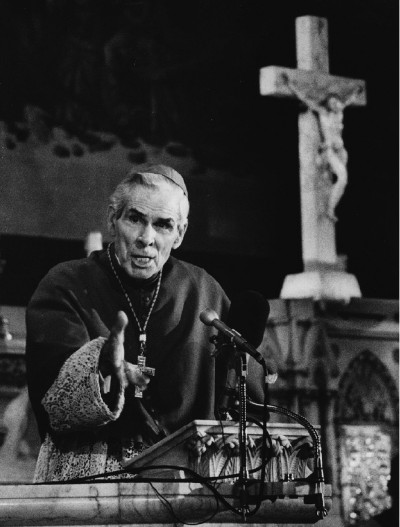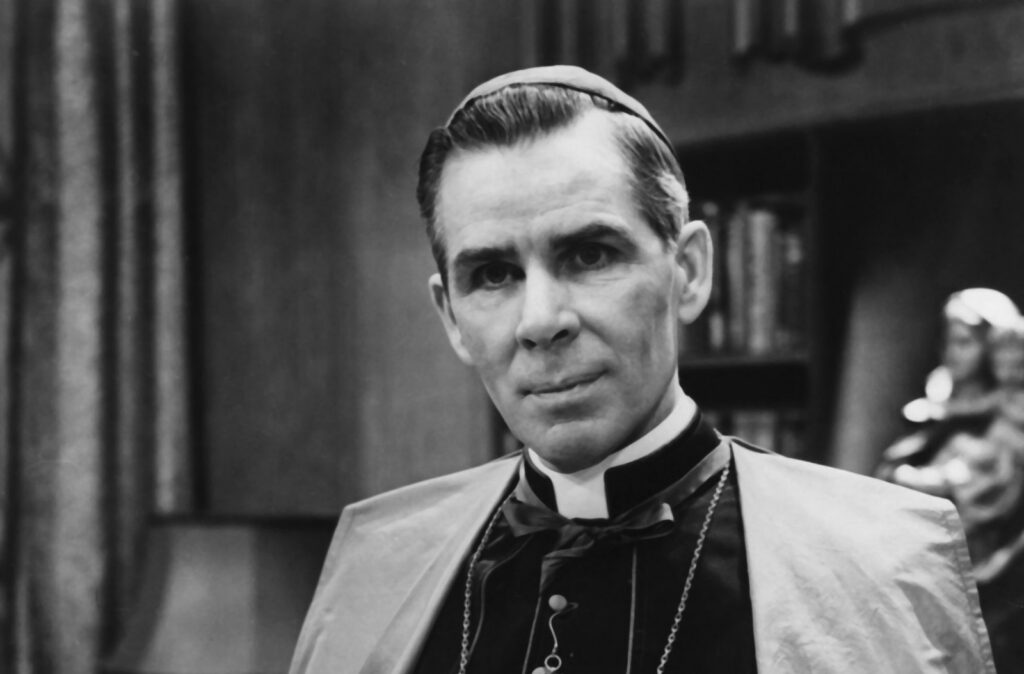1895-1979
Feast day: Dec. 9
Venerable Fulton J. Sheen is remembered as one of the most influential and innovative evangelists in American history. Once dubbed “God’s microphone,” Sheen announced God’s truth to untold millions through radio, print and television.
Sheen’s many successes in his mission grew from his love for the Eucharist. He once said that “the greatest love story of all time is contained in a tiny white host.” This was the love that transformed him, making him an effective evangelist and Gospel witness. Throughout his 60-year priesthood, Sheen sought to conform himself more closely to Christ by observing a daily Eucharistic Holy Hour, what he called “the hour that makes my day.” From his office desk, through an open door, he could gaze upon the tabernacle at all times. His union with Christ enabled him to more fully, more accurately and more convincingly lead others to Christ in all he said and did. Sheen was a man of many talents and accomplishments, but it was Christ’s presence in the Eucharist that guided him to use them most effectively.
Born in El Paso, Illinois, on May 8, 1895, Sheen resolved to serve the Church as a priest from an early age. He was assigned to academic ministry following his ordination to the priesthood on Sept. 20, 1919, for the Diocese of Peoria.
“The greatest love story of all time is contained in a tiny white host.”
After studies in Europe, a promising future as a professor awaited Sheen. But his bishop tested his obedience by first sending him back to a parish in Peoria — a task he zealously accepted. In less than a year, though, Sheen landed a professorship at The Catholic University of America in Washington, D.C, where he taught for 25 years. During that time, he published more than half of his more than 60 books, informed by a lively and heroic faith.
And Sheen became a household name at this time, too — known as a prophetic truth-teller who spoke out on a host of issues, particularly the threats of communism — as host of “The Catholic Hour,” broadcast nationally from NBC Radio in New York.
Soon after being selected as director of the Society for the Propagation of the Faith in 1950, Sheen was appointed an auxiliary bishop of New York, and he was ordained in Rome on June 11, 1951. He began his work on behalf of the global missions with great energy, and his innovative efforts enabled him to evangelize at the same time.

CNS file photo
Beginning in 1952, Sheen proposed eternal truths each Tuesday evening to tens of millions via his “Life Is Worth Living” TV program, armed only with his charisma and intellect — and his famous cape and chalkboard. After his first year on the air, Sheen won an Emmy award for best television personality. Upon acceptance, he famously thanked his writers: Matthew, Mark, Luke and John.
Sheen battled various temptations and difficulties throughout his life, many of which came as the result of his fame. He understood his sufferings in light of God’s providence: “Christianity begins not with sunshine, but with defeat. During those days when my life was backed up against the cross, I began to know and to love it more.”
Despite his best efforts as bishop in Rochester, New York (1966-69), Sheen’s brief tenure was met with great resistance, resulting in a good deal of self-described failure. The temptations and sufferings Sheen faced purified him and intensified his union with Christ. He maintained, “God has been easy with me.” Toward the end of his life, writing in his autobiography, Sheen apologized for his failures, wondering, “Was I inspiring anyone to imitate Christ in the daily carrying of his cross?”
After nearly two years in and out of the hospital following open-heart surgery, Sheen died Dec. 9, 1979, in New York City, in the presence of the Blessed Sacrament. After a miracle attributed to his intercession was approved by Pope Francis in 2019, the Church awaits his beatification.
Michael R. Heinlein is editor of OSV’s Simply Catholic. He writes from Indiana. Taken from the “Inspired by the Eucharist” saint booklet.

